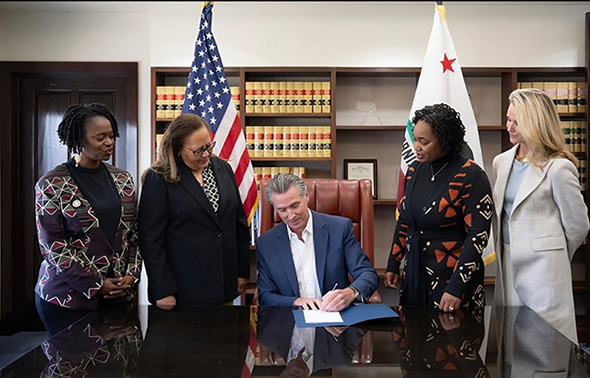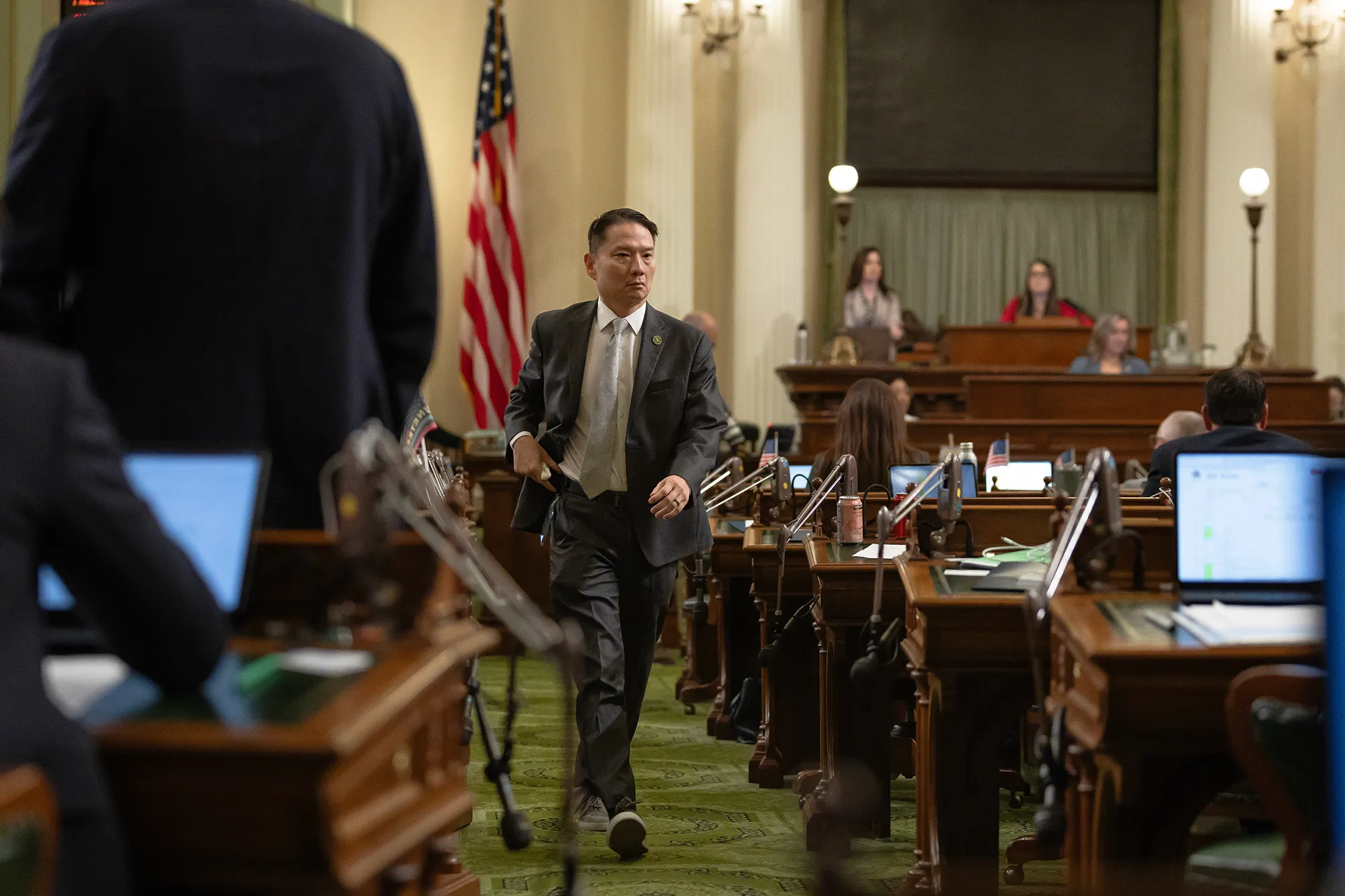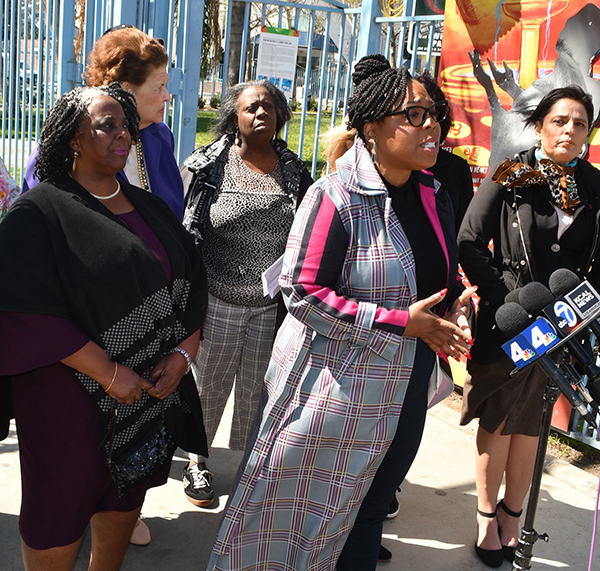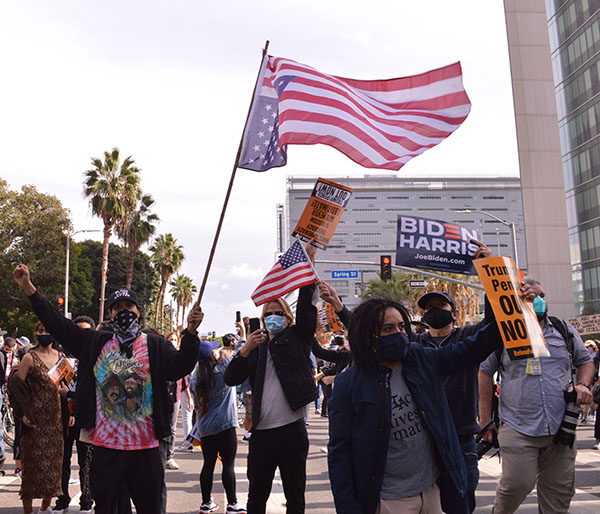State creates first reparations agency in U.S.

Gov. Gavin Newsom signs Senate Bill 518 as members of the California Legislative Black Caucus look on. Pictured with Newsom are, from left, State Sens. Lola Smallwood-Cuevas, D-Los Angeles, Laura Richardson, D-San Pedro; Akilah Weber Pierson, D-San Diego); and first partner Jennifer Siebel Newsom
Courtesy photo
By Antonio Ray Harvey
Contributing Writer
SACAMENTO — Gov. Gavin Newsom has signed Senate Bill 518, landmark legislation creating California’s Bureau for Descendants of American Slavery — the first state agency in the nation dedicated to implementing reparations for Black Americans.
“A few days ago, I, with a few other members of the California Legislative Black Caucus, met with Gov. Newsom as he signed my bill SB 518 — the Bureau for Descendants of American Slavery,” said state Sen. Akilah Weber Pierson, D-San Diego, and author of the bill. “California has taken a monumental and historic step toward justice, becoming the first state in the nation to create a permanent agency dedicated to reparative justice for Black Americans.”
The governor first hinted at the signing during an appearance on the Higher Learning podcast, hosted by Rachel Lindsay and Van Lathan Jr., before his office made the news official in an Oct. 10 press release.
“I just signed a bill two days ago with the (California Legislative) Black Caucus as it relates to creating a new office to address these systemic issues,” Newsom told the hosts.
SB 518 establishes a permanent state agency tasked with implementing reparations policies for descendants of enslaved African Americans and those whose families were harmed by racially motivated eminent domain in California. The bureau will verify eligibility, safeguard privacy, educate the public, and coordinate future reparative justice initiatives.
“For centuries, the descendants of enslaved people have endured hardship, exclusion and systemic injustice that denied them access to opportunity and equality,” Weber-Pierson said in a statement. “SB 518 is a step toward acknowledging that painful truth and creating the structures needed to repair it. This bill represents hope, responsibility and a commitment to make right what was wrong for far too long.”
The legislation was directly based on policy recommendations from the Task Force to Study and Develop Reparation Proposals for African Americans, which issued its comprehensive final report in June 2023. The task force was created through Assembly Bill 3121, authored by current Secretary of State Shirley Weber in 2020, to research the history of discrimination against Black Californians and recommend remedies for compensation and atonement.
SB 518 is part of the California Legislative Black Caucus’ Road to Repair 2025 Priority Bill Package, which aims to implement the task force’s recommendations. The bill was supported by 15 community, equity,and legal organizations, along with three former task force members, including former chairperson Kamilah V. Moore.
Moore, who shared a video of Newsom’s podcast appearance on Oct. 10, said she didn’t expect the governor to announce the signing publicly before it was official.
“The interview came out on Oct. 10, but it was filmed a day before,” she told California Black Media. “I know because Van Lathan gave me a heads up and told me Newsom was coming on.”
Moore previously supported a similar bill, SB 1403 by former state Sen. Steven Bradford, D-Inglewood, which stalled in August 2024 after the Black caucus chose not to advance it. Despite her disappointment at the time, she said SB 518 represents meaningful progress.
“It’s great news in a sense,” Moore said. “It’s not exactly what was delineated in the task force report, but it is something we can work with.”
Not all advocates share that optimism. The Coalition for a Just and Equitable California has criticized SB 518, arguing it doesn’t go far enough to provide immediate redress.
“Let’s be clear — SB 518 is not real Reparations, nor is it a step closer to real reparations,” coalition spokesperson Chris Lodgson said. “It’s a bureaucratic shell that delays reparations, expands beyond the lineage it claims to serve, and diverts precious time and resources away from the real work of repair.”
Khansa “Friday Jones” Jones-Muhammad, vice president of the Los Angeles Reparations Advisory Commission and president of the National Assembly of American Slavery, said she still prefers Bradford’s earlier bill but is prepared to move forward.
“With the signing of SB 518 by Gavin Newsom, the California Legislative Black Caucus has an opportunity to repair the feelings of betrayal that advocates experienced when two reparations bills were sent to a suspense file last year,” she said.
Weber Pierson said she and the Black caucus remain committed to addressing structural disparities in California.
“SB 518 is not just policy — it is a promise kept,” she said. “It honors the truth, dignity and humanity of descendants of enslaved people and begins the process of healing wounds that have gone unaddressed for generations.”
According to the bill’s language, the bureau’s implementation will depend on funding from the Legislature and may also receive federal, state and non-governmental grants. Over time, the bureau is expected to expand its scope to address additional historical harms as part of the state’s broader reparative justice efforts.
While Newsom signed SB 518, he vetoed other bills that were part of the Black caucus’ legislative package. Newsom vetoed Assembly Bill 7, authored by Assemblyman Isaac Bryan, D-Culver City, that would have allowed public and private colleges to provide preferential admissions to applicants directly descended from individuals who were enslaved in the United States before 1900.
Newsom called the bill “unnecessary,” writing in his veto message that “institutions already have the authority to determine whether to provide admissions preferences like this one.”
The governor also vetoed bills that would have provided assistance to descendants of slaves in some state programs. Those included legislation that would have required the state Department of Consumer Affairs’ licensing boards to expedite applications from people who are descendants, and a bill that would set aside funds from a state program providing financial assistance for first-time home buyers.
Antonio Ray Harvey is a reporter for California Black Media.





